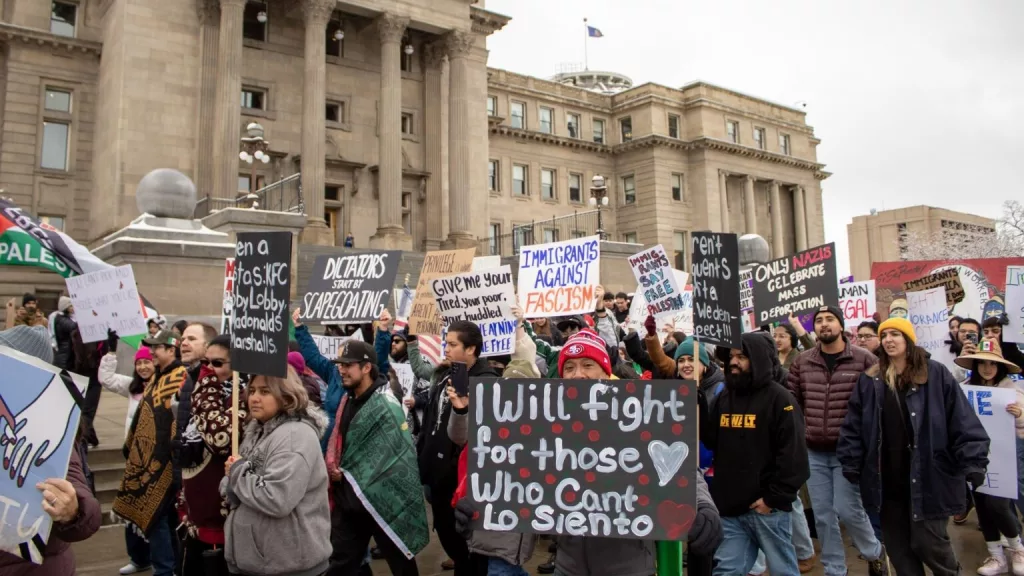BOISE, ID – A federal judge on Thursday evening temporarily blocked a new Idaho immigration law from taking effect.
The block was issued hours after the ACLU of Idaho on Thursday filed a lawsuit against the state of Idaho over a new policy Idaho Gov. Brad Little signed into law on Thursday, which allows law enforcement to record a person’s documentation status if they are suspected of a crime.
Modeled after a controversial 2023 Texas law, House Bill 83, as amended, creates Idaho immigration crimes “illegal entry” and “illegal reentry,” targeting individuals who do not have proper immigration authorization and those who have already been deported from coming to Idaho. Law enforcement would only be able to convict someone of those crimes if they are suspected for a different crime.
The law also creates the crime of “trafficking a dangerous illegal alien,” or knowingly transporting an unauthorized immigrant who has previously been convicted of a crime in the U.S. or another country. The law grants immunity to law enforcement, meaning they are protected from lawsuits that could arise from the damages and liability they cause while enforcing the law.
As federal agencies tighten immigration enforcement, House Bill 83 represents Idaho’s own approach to address unauthorized immigration in the Gem State – where about 35,000 unauthorized immigrants live, according to a report from the University of Idaho’s McClure Center for Public Policy.
However, the ACLU of Idaho anticipated the law taking effect, and it immediately sued.
About Idaho’s newest lawsuit: IORC v. Labrador
There are multiple plaintiffs in the case including the Idaho Organization of Resource Councils, an organization that promotes the safety, health and justice of immigrant communities. Another plaintiff includes The Alliance of Idaho, a nonprofit that provides low-cost immigration services to families in Blaine County. There are also five individual plaintiffs whose names are anonymous in the lawsuit for protection purposes, including four Mexican citizens and a Peruvian citizen who live in Idaho and Oregon, all of whom have children who are U.S. citizens.
The defendants include Idaho Attorney General Raúl Labrador and 13 prosecuting attorneys who represent the counties that the plaintiffs live in, ACLU of Idaho spokesperson Rebecca De León told the Idaho Capital Sun. The lawsuit alleges House Bill 83 violates the U.S. Constitution in three ways.
First, the plaintiffs allege the law violates the Supremacy Clause of the U.S. Constitution, which establishes that federal law overrides state law, including in immigration matters.
“Courts in other states who have passed these laws have agreed with our legal argument, and we expect the court to do so here,” ACLU of Idaho legal director Paul Carlos Southwick said in a press conference, referring to immigration policies in Texas, Iowa and Oklahoma.
Second, the plaintiffs allege the law violates the Commerce Clause in the U.S. Constitution because it regulates people’s ability to enter into Idaho and imposes burdens on interstate and foreign commerce.
Third, they argue the law is vague.
“This was a result of a lot of back and forth between the House and the Senate and deciding what version of this bill would pass, and unfortunately they cobbled together a version that is incomprehensible,” Southwick said. “And everyone, including our undocumented community, has a right to understand the law so that they know what the provisions of that law are and what they may or may not be violating.”
Bill sponsors say law targets immigrant criminals. ACLU of Idaho disagrees.
Bill sponsors have said the bill’s purpose is to curb unauthorized migration and prevent dangerous unauthorized immigrants from entering Idaho.
However, Southwick said the bill clearly does not just target criminals.
“You do not have to have any criminal conviction in order to be arrested, detained or prosecuted for these crimes,” he said in a press conference. “Law enforcement merely needs suspicion that you have engaged in some kind of independent crime.”
Emily Croston, a staff attorney at the ACLU, agreed with Southwick.
“It affects anyone who is stopped or accused of committing even minor crimes, so these could include littering, shoplifting or disturbing the peace,” she said. “So even if someone is never actually convicted for those minor crimes, if there’s suspicion against them, then the police are allowed to engage in prosecuting the H.B. 83 crimes.”
Croston said the law would discourage unauthorized immigrants from reporting crimes they’ve witnessed or are experiencing.
Because the bill had an emergency clause, it went into effect immediately after the governor signed it. The court’s temporary restraining order issued Thursday evening will prevent the law’s enforcement for 14 days. The lawsuit has been assigned to federal Judge Amanda Brailsford, and a preliminary injunction hearing is scheduled at 10 a.m. April 10 at the James A. McClure Federal Building and U.S. Courthouse in Boise. A preliminary injunction could block the law’s enforcement throughout the litigation process.
This story first appeared on Idaho Capital Sun.
